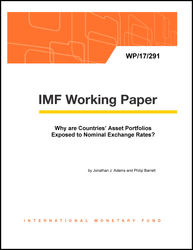
Why are Countries’ Asset Portfolios Exposed to Nominal Exchange Rates?
Most countries hold large gross asset positions, lending in domestic currency and borrowing
in foreign. Thus, their balance sheets are exposed to nominal exchange rates. We argue that
when asset markets are incomplete, nominal exchange rate exposure allows countries to
partially insure against shocks that move real exchange rates. We demonstrate that asset
market incompleteness can simultaneously generate realistic gross asset positions and resolve
the Backus-Smith puzzle: that relative consumptions and real exchange rates correlate
negatively. We also show that local perturbation methods that use stabilizing endogenous
discount factors are inaccurate when average and steady state interest rates differ. To address
this, we develop a novel global solution method to accurately solve the model.
Publication date: December 2017
ISBN: 9781484335468
$18.00
Add to Cart by clicking price of the language and format you'd like to purchase
Available Languages and Formats
| English |
Prices in red indicate formats that are not yet available but are forthcoming.
Topics covered in this book
This title contains information about the following subjects.
Click on a subject if you would like to see other titles with the same subjects.
Country portfolios , international business cycles , home bias , gross asset positions , exchange rates , Backus-Smith puzzle , General , Open Economy Macroeconomics
Summary
Copyright © 2010 - 2024
Powered by:
AIDC



